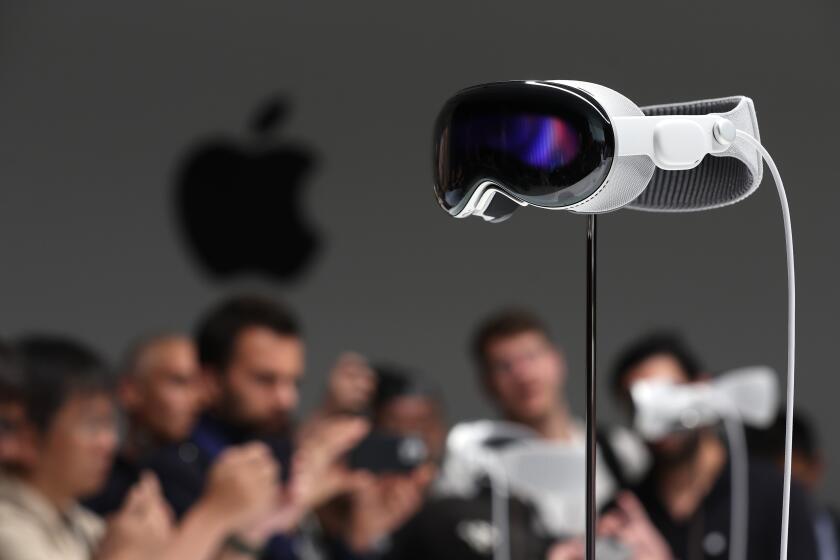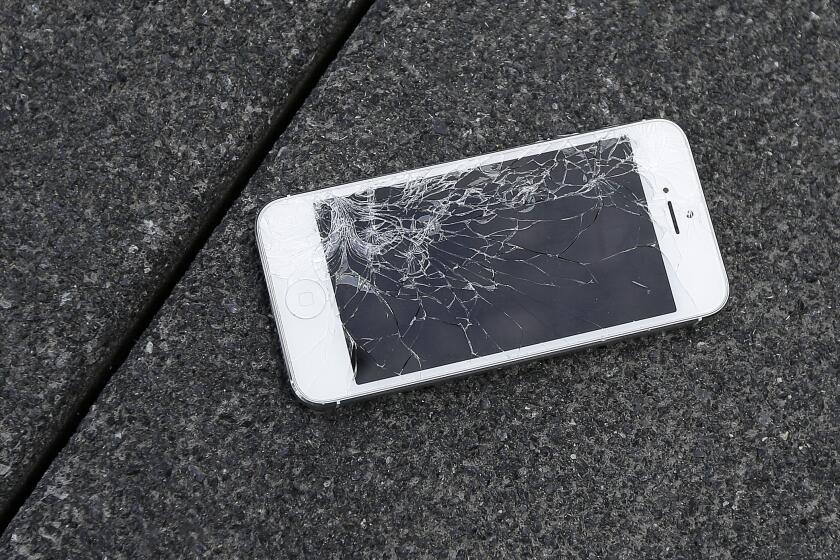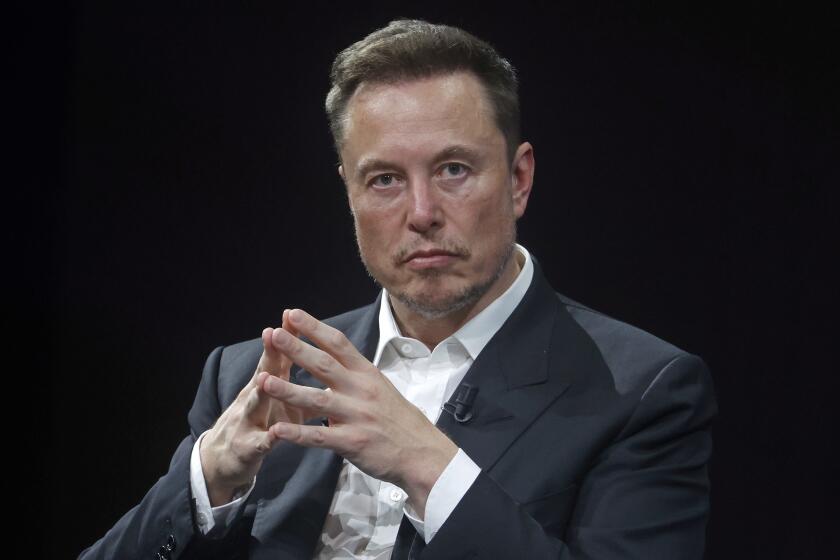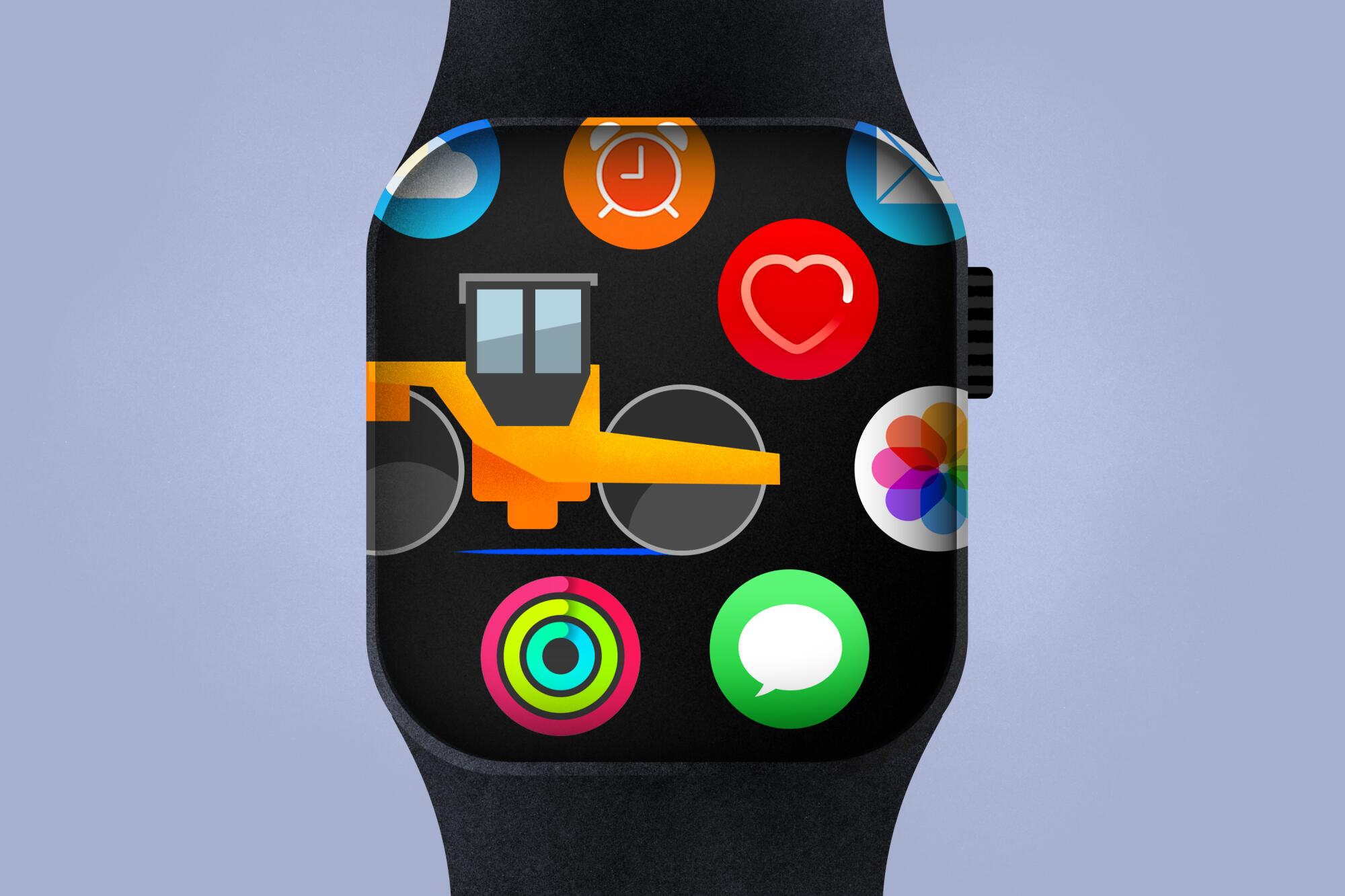
- Share via
When Apple executives first knocked on the medical device entrepreneur Joe Kiani’s door, he was thrilled. Why wouldn’t he be?
Kiani, an electrical engineer by training, had founded the Irvine company Masimo in 1989. Over the next three decades, he and his colleagues built Masimo into an industry leader in pulse oximetry, used to take readings of the amount of oxygen in a person’s blood — a crucial, sometimes life-saving, measurement.
So when, in 2013, “Apple came and said, we want to work with you,” Kiani recalls, he saw it as an opportunity to bring an innovation that could help millions to the largest stage possible.
Kiani and the Apple executives had long, involved, and, what felt to him, productive meetings. It even seemed that Apple was interested in acquiring Masimo. “They asked us, ‘Where do we see the market going?,’ ‘How does the tech work?,’ to share with them the regulatory pathways. All the leadership was there, saying, ‘whatever you need, we’re going to work this out.’”
Now, 10 years later, Kiani is locked in an acrimonious legal battle with the world’s biggest tech company, alleging Apple infringed on his patents and stole trade secrets. If Kiani wins, it could stop Apple Watches, which are manufactured in China, from being imported into the U.S.
Two years after Mark Zuckerberg bet his company on a virtual reality future, Apple in effect declared that vision dead with its announcement of a decidedly antisocial face computer.
According to the complaint in his case, unbeknownst to Kiani, back when the two companies started meeting, Apple hatched a plan, known internally as Project Everest, to obtain or emulate Masimo’s technology without paying Kiani a cent. Instead of acquiring Masimo, Apple could simply raid its brain trust. In at least one email exchange between executives, Apple referred to its strategy as “smart recruiting.”
Apple hired away two of Masimo’s former top executives, doubling their salaries, and then started in on his other employees.
“They start going after my people,” Kiani says. “A lot of my people didn’t go, but they still got 20 of my people.” In the trial, Apple has admitted to hiring two former Masimo executives and at least five other employees. (Apple declined to comment on any of Kiani’s allegations or to respond on the record to my questions.)
Apple, of course, is one of the largest and most powerful companies in history — it’s the first to hit a $3-trillion — that’s trillion, with a T — market cap. When it sets its sights on a smaller company, many founders and executives often see little choice but to roll over and make way for the behemoth, or find ways to make the best of it.
Not Joe Kiani. He’s already spent $60 million fighting the tech giant in court, making the case that Apple infringed his patents and stole trade secrets, and he estimates that’s just half what the whole battle will wind up costing.
He’s on a mission to stop Apple from steamrolling smaller companies, to see that consumers get tech that actually works — he says that Apple’s pulse ox tech leaves users who may depend on it at risk — and to get the fruit company to start acting more ethically. He wants to stop Apple from delivering what he calls “the kiss of death” to more vulnerable companies — showing interest, wining and dining them, then stripping them for parts.
The U.S. International Trade Court, which is hearing his case, already ruled that Apple infringed at least one of Masimo’s patents back in January, and is slated to make its final ruling this month. If it decides Apple has infringed Masimo’s patents, it could seek an order to stop Apple Watches from being imported at the point of entry, which would force Apple to swap out the pulse ox tech altogether — or agree to list Masimo as a patent holder, entitling it to a share of the profits.
By looking at this David vs. Goliath story, we can learn a lot — about how a tech company becomes all-powerful in the modern age, and how it works to protect its position at all costs.
Column: Apple has fought the right to repair devices for years. Why did it just make a U-turn?
Apple, a potent foe of legislation backing consumers’ right to fix their gadgets, is suddenly an ally: It has come out in favor of California’s SB 244.
Apple may appear to be a monolith, a singular font of technological innovation issuing sleek new products and features from the brains of its engineers and designers inside its spaceship-like HQ in Cupertino, Calif. But like all the other major tech giants, it’s more accurately a patched-together Frankenstein, relying on a constant stream of reanimated parts it’s acquired, licensed, or swiped outright from other companies.
Co-founder Steve Jobs, after all, famously said of Apple’s philosophy in the 1996 PBS documentary, Triumph of the Nerds, “Picasso had a saying: ‘good artists copy; great artists steal’ — and we have always been shameless about stealing great ideas.” From the outset, in other words, Jobs was clear that part of Apple’s strategy would be to take or imitate ideas, talent, and products from competitors. The most famous example is Apple’s storied 1979 raid on Xerox PARC, whose engineers had developed a host of technologies, such as the graphical user interface, or GUI (what your computer desktop looks like right now), but didn’t know what to do with them. Jobs & Co. took what they saw at Xerox and applied it to their revolutionary design for the Macintosh.
This is what a savvy, and perhaps ruthless, tech company intent on cornering a market does, and has done ever since — press its advantage to snap up competing ideas or companies, wholesale, sometimes, but piecemeal too. Another example: When Jobs unveiled the iPhone in 2007, he casually announced that “we have invented a new technology called multitouch,” the key feature that would let users navigate screens with a press of their finger. Except that couldn’t be further from the truth.
I wrote a book about the iPhone back in 2017, and one of the surprising discoveries I made was just how little Apple had to do with inventing multitouch. Work on multitouch in fact stretched back decades, from the labs at CERN in Geneva, to the workshops of Bill Buxton, a Canadian computer scientist, and to FingerWorks — a multitouch-based keyboard system developed by Wayne Westerman to make typing easier on his repetitive strain injury, and established as a company in 1998. Apple scooped up the company, along with Westerman and FingerWorks’ patents, in 2005. Two years later, Westerman watched Jobs claim that Apple invented multitouch on a screen miles away from the stage — he wasn’t even invited to attend the debut event.
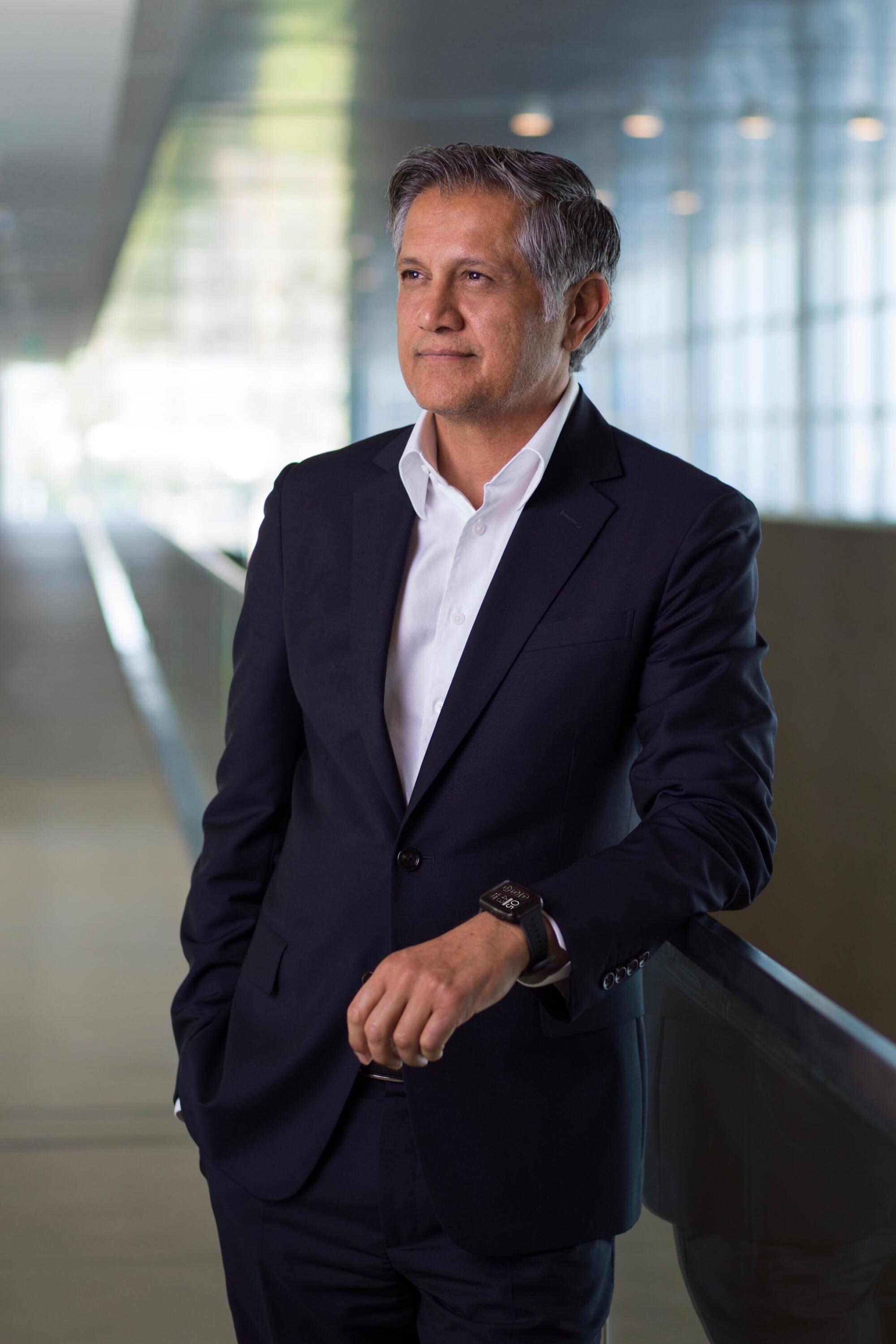
There’s nothing illegal about that — Apple bought the whole company including its intellectual property — or what Apple did at Xerox PARC — the folks at Xerox had welcomed them in — but the pattern is instructive. Companies such as Apple want consumers to believe that they’re the engines of innovation, that it is they who are building the future. Under the acquisition deal, FingerWorks could not even publicly admit that it had been bought by Apple. It just went dark one day.
Apple is far from alone in the practice of expansion via acquisition or emulation; the story of consumer technology in the 21st century is largely the story of a handful of tech giants becoming monopolies and oligopolies by buying up, absorbing, or cloning the competition. Google didn’t “invent” its Maps or YouTube apps — it bought them. Facebook hoovered up Instagram and WhatsApp, and has shamelessly cloned features from Snapchat and TikTok. Amazon acquired competitors such as AbeBooks, took over the audiobook space by buying Audible, snatched up Zappos to corner the online shoe store market, and so on.
And this is where things get unsavory. For every big-ticket acquisition and attempt to get the public to forget that it was an acquisition at all — Siri, Apple’s 2010 purchase, comes to mind too — we have to assume that there are numerous, uh, let’s say messier cases of these giants deciding not to acquire a smaller outfit with something they want, but trying to figure out how to ape its tech anyway.
Call it the ‘Isaacson Accord’: the agreement behind Walter Isaacson biographies, including ‘Elon Musk,’ to leave the assumption of difficult genius untouched.
Earlier this year, the Wall Street Journal spoke to two dozen executives, inventors, and founders who feel like Apple delivered the same “kiss of death” Kiani described the giant giving to Masimo.
And for anyone who cares about technology, this is a huge problem.
Joe Kiani is precisely the kind of individual that pundits and politicians are always saying we want starting tech companies — he immigrated to the United States when he was 9, graduated high school at 15, and had completed a bachelor’s and a master’s in electrical engineering at San Diego State by the time he was 22. He quickly rose through the ranks at a medical tech company, and was tasked with building pulse oximeters in the late ‘80s, before striking out on his own.
Over the years, he built new and better pulse oximeters, becoming the leader in the tech in the United States. Thanks to Masimo’s pulse oximeters, millions of at-risk people have been able to monitor their lung health, baby blindness in neonatal intensive care units has been reduced dramatically, and those at risk of overdosing on opioids have been given a lifeline. Some 200 million patients are monitored by Masimo technologies every year.
The pulse oximetry tech developed by Masimo has, Kiani says, “not only solved the problem that I imagined it would,” but helped in many more arenas. “It’s been wonderful.”
All that is why, when Apple decided to enter the smartwatch space, it quickly set its sights on Masimo. Internal Apple email correspondence revealed during the trials have shown that Apple established two efforts to seek out the best sensor tech for the Watch — Project Rover, which looked for companies to work with, and which led to Masimo, and then, Project Everest, an effort to plumb Masimo’s tech specifically.
After one executive floated the idea of acquiring Masimo outright, the decision was shot down. “Acquisitions of this size aren’t our style,” Adrian Perica, Apple’s vice president of corporate development, said in court. Instead, Apple opted to take the “smart recruiting” approach.
Apple hired the chief technical officer at Masimo’s sister company, Cercacor, Marcelo Lamego, and Masimo’s chief medical officer, Michael O’Reilly. Apple doubled their already generous compensation, and offered Lamego $4 million in company stock, Kiani says.
In the first two weeks that Lamego was at Apple, he filed 12 patents for medical and sensor technologies for the Watch. Though he would only stay at the company for six months, Lamego would be named as an inventor on many more. Meanwhile, after O’Reilly was hired at Apple, he attended at least one medical trade convention under a fake company name, Masimo’s attorneys established in courtroom questioning.
“They took some of our trade secrets that were really important to us,” Kiani says, echoing allegations made in his lawsuits. “They had six patents that had been filed in Marcello’s name — five were patents we had already filed. This was all our stuff he took to them. They purposefully didn’t let them publish until right before the product came out.”
Lamego and O’Reilly insist that all of this is above board, and that they never infringed Masimo’s intellectual property. And the worst part for consumers is, when the pulse oximetry technology Apple had gone to such lengths to emulate finally debuted in 2020, in the Series 6 Watch, it was worse than a dud — it was found dangerously deficient in tests conducted by the Washington Post.
“Our initial fear was that their product would be so good it would put us out of business,” Kiani said. “When we saw how bad it was, we thought it’s going to be dangerous — bad for the industry.” Sometimes, it sends out false alarms for arrhythmia, other times, no alarm at all. “Think about the burden that puts on the healthcare system,” Kiani says. Or the false sense of security this “toy” provides to people who may in fact need real help.
Indeed, when it was rolled out, Washington Post columnist Geoffrey Fowler wrote a whole piece about its wildly inaccurate and unreliable readings. “It should not be acceptable for giant tech companies to market devices that take readings of our bodies,” he concluded, “without disclosing how those devices were tested and what their error ranges might be.”
Masimo says that Apple took some of its tech, but not all, resulting in pulse oximeter tech that doesn’t work as well as it should, which damages the reputation of the entire industry in which Masimo’s a leader. (The authors of an April 2023 paper in the journal Nature compared the Apple Watch 6 with medical-grade pulse oximeters and found it “frequently” produced outlier values, but said the stray measurements “should not be a cause for concern in otherwise healthy individuals.” The authors also noted “the performance of the most recent model might differ.”)
Masimo filed a suit against Apple, accusing it of stealing trade secrets and infringing its patents, in 2020. That suit resulted in a mistrial earlier this year. However, Masimo also filed a complaint in the U.S. ITC in 2021. And in the first rounds of those proceedings, the court found that Apple did indeed infringe one of Masimo’s patents — the hearing to determine whether the body will issue an exclusion order or another remedy is set for October.
If he wins, Apple will be forced to remove the tech from the Apple Watch, design around it somehow, or face getting the Watch held up at the border when it’s imported into the U.S. — an all but totally implausible outcome that nonetheless has victims of Apple’s “Kiss of Death” daydreaming about justice.
In another trial this year, the ITC determined, in a final ruling, that Apple infringed on the patent of another medical tech company, AliveCor, which develops wearable electrocardiogram technology. Apple succeeded in getting the Patent Trial and Appeal Board to invalidate that patent as overly broad; AliveCor is appealing that ruling. (Apple has sought to have PTAB invalidate Masimo’s patents on similar grounds.)
It requires an extremely powerful suspension of disbelief to not see a pattern here; to ignore how Apple is wielding its power to get what it wants, when it wants.
There are increasingly few figures willing to stand up to the giants such as Apple, which has a nearly endless reserve of capital and resources to wage battles against folks such as Kiani. But let’s be thankful he’s willing to wade into the trenches — the consolidation of tech is strangling competition, hurting consumers, and constraining actual innovation.
“Ultimately what I really want is,” Kiani says, “people having the right product. There are a hundred million people wearing a dangerous toy. They could have had a great product that saves lives.”
“I want this to sting so bad for them — they don’t care about the money,” he continues. “What they care about is public persona. They go out of the way to create this veneer ‘we’re the good guys and we’re the rebels’. I want Apple to change their ways and conduct themselves in a moral, ethical way. They can use their power to make the world a better place.”
